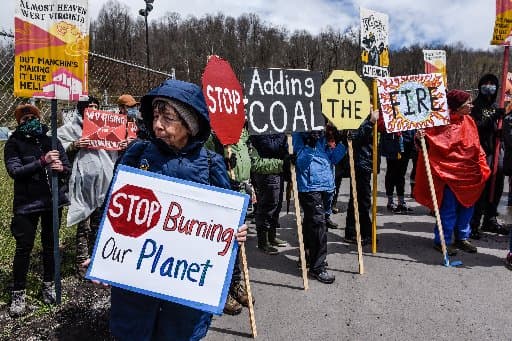CLEVELAND — Advocates expressed disappointment that the U.S. Supreme Court has limited Environmental Protection Agency action to reduce greenhouse gas emissions from power plants, but said they will continue to push Congress to enact much-needed climate change legislation.
“We want to focus on getting ambitious and urgent climate solutions implemented now, recognizing that the window is closing on this opportunity based on the scientific evidence,” said Jose Aguto, executive director of the Catholic Climate Covenant.
The covenant will mobilize its “Encounter for Our Common Home” initiative that finds people working in parishes and through national and local organizations to contact members of Congress about vital environmental protection issues.
At the Franciscan Action Network, Sister Louise Lears, coordinator of creation care advocacy and a member of the Sisters of Charity of Cincinnati, will count on the organization’s 17 Franciscan Justice Circles to rally support for federal funding for environmental justice and climate change measures.
She pointed to a legislative package with more than $550 billion in the Biden administration’s environmental priorities, including incentives to reduce the country’s dependence on fossil fuels. The bill continues to be the focus of negotiations among Democratic leaders in the Senate.
Legal observers said the court’s 6-3 ruling leaves the Biden administration a narrower path to achieve reductions in emissions of greenhouse gases under the 2015 Paris agreement.
Greenhouses gases result from the burning of coal and other carbon-based energy sources. They accumulate in the atmosphere and are a leading driver of climate change, decades of scientific research has concluded.
The court’s June 30 ruling, with conservatives in the majority, concluded that the EPA overstepped its authority under the Clean Air Act to regulate power plant emissions.
The ruling also disappointed Archbishop Paul S. Coakley of Oklahoma City, chairman of the U.S. bishops’ Committee on Domestic Justice and Human Development.
“The Catholic bishops of the United States have long supported the EPA’s ability to regulate greenhouse gases in order to address climate change,” Archbishop Coakley said in a July 1 statement that pointed to the committee’s long-standing support for the agency’s efforts to limit power plant pollution.
“Both reasonable regulation and legislation are critical for addressing the threat and challenges of climate change. We call upon Congress to give the EPA the necessary authority to meaningfully regulate greenhouse gases,” the archbishop said.
Writing for the majority, Chief Justice John Roberts said policies that have wide-ranging economic and political implications must be set by Congress rather than a government agency.
“Capping carbon dioxide emissions at a level that will force a nationwide transition away from the use of coal to generate electricity may be a sensible ‘solution to the crisis of the day,'” Roberts wrote.
However, he added, the Clean Air Act does not give the EPA the authority to move the country away from coal to cleaner energy sources and that Congress must clearly indicate its intent through legislation.
“A decision of such magnitude and consequence rests with Congress itself, or an agency acting pursuant to a clear delegation from the representative body,” Roberts wrote.
In a strongly worded dissent from the court’s liberals, Justice Elena Kagan concluded that the decision strips the EPA of the power Congress originally gave it to address “the most pressing environmental challenge of our time.”
“Whatever else this court may know about, it does not have a clue about how to address climate change. And let’s say the obvious: The stakes here are high. Yet the court today prevents congressionally authorized agency action to curb power plants’ carbon dioxide emissions. The court appoints itself — instead of Congress or the expert agency — the decision-maker on climate policy. I cannot think of many things more frightening,” Kagan wrote.
Andrew Twinamatsiko, associate director of the Health Policy and the Law Initiative at the O’Neill Institute for National & Global Health Law of the Georgetown University Law Center, said the EPA can still act to reduce greenhouse gas emissions, but only in a limited manner.
“The court said if Congress wants EPA to take a particular action that is very transformative then it has to come from Congress. From the court’s opinion, that without congressional action, the steps that EPA can take are going to be modest and won’t be able to meaningfully address climate change,” he told Catholic News Service.
The ruling, he added, has implications across federal agencies because officials will now have to look more closely at proposals for rulemaking and regulations to determine the intent of Congress.
The decision in West Virginia v. EPA stems from the Obama administration’s Clean Power Plan, which never took effect. Several Republican-led states challenged the plan saying the EPA had no authority to enforce it.
The Supreme Court blocked the plan from going into effect while the lawsuits continued. The EPA under President Donald Trump then jettisoned the plan entirely, implementing a more limited approach on power plant emissions.
In turn, Democratic-led states challenged the approach, which led a federal appeals court to strike down the plan. The Supreme Court decided to hear the case even without a greenhouse emissions plan in place and as the Biden administration was preparing its own emissions reduction proposal.
Representatives of the Biden administration said that the decision will only slow, rather than block, EPA’s efforts to transition the nation away from coal to renewable and less-polluting sources of energy for power generation.
Speaking with NPR July 1, Gina McCarthy, White House climate adviser, called the decision a disappointment, but that it did not strip away EPA authority to regulate greenhouse gases.
While the work of the EPA may now be limited, McCarthy said President Joe Biden has pledged a “whole government approach” to enact policies to address climate change including investments in clean energy.
“We are leaving no stone unturned to transition and invest in a clean energy future,” she said.












